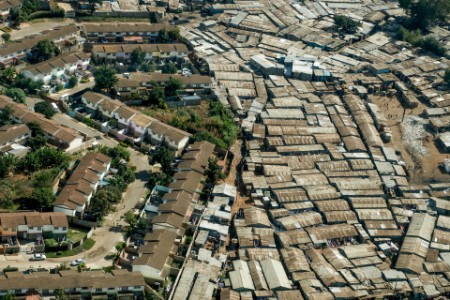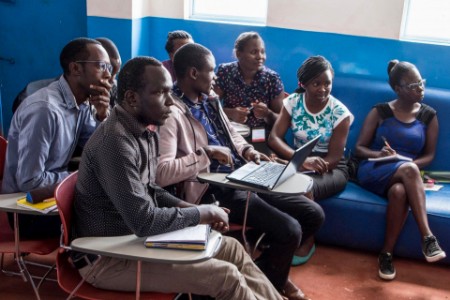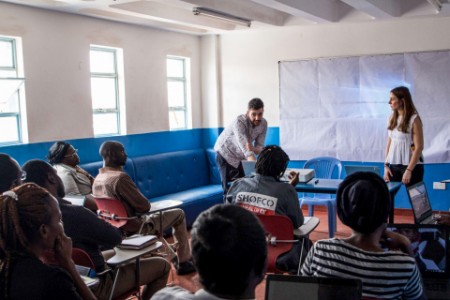
The better the question
How can data be used to address gender-based violence in Kenya?
Using metrics to improve a community.
SHOFCO (Shining Hope for Communities) is a non-profit organization based in Nairobi, Kenya focused on combating poverty and gender inequity through transformation in urban slums. They provide critical services, community advocacy platforms, and education and leadership development for women and girls in six urban settlements, with over 220,000 beneficiaries.
A large portion of SHOFCO’s work is centered on Kibera, the largest slum in Africa and second biggest in the world. Around one million people live in Kibera, or one fifth of the city’s population. Most residents live in extreme poverty, earning less than US$1 per day and lacking access to basic services like electricity, running water and medical care.
In these communities, there is a high prevalence of domestic violence, community violence and a lack of social safety nets. SHOFCO places added emphasis on gender-based violence, awareness and response services here due to the overwhelming need and lack of services.
How EY can help

The better the answer
Identifying violence ‘hotspots’ and trends
SHOFCO could capture and track the data but needed support with analysis and team capability building to gain more fact-based insights.
One of the biggest challenges in tackling gender-based violence (GBV) worldwide is reporting and transparency. Not all crimes are reported and of those that are, only a small proportion make it to the justice system. This is a particular issue in Kenya where police corruption is high, with Transparency International-Kenya ranking the police force as the most bribery-prone institution in its 2017 East African Bribery Index (Reuters).
The Kenyan government has a database capturing data on GBV, but corruption impacts its accuracy.
SHOFCO has its own department tackling GBV and collects data from their clinics’ eHospital system and direct reporting. With a relatively strong availability of data, it’s considered to be more accurate than the government database. SHOFCO were able capture and track the data but needed additional support with analysis and capability building among team members so they could gain more fact-based insights.
EY’s Adrienn Demeter, a Senior Consultant in Data and Analytics, and Timothy Higgins, a Consultant in Financial Services Advisory, worked with SHOFCO, using data analytics and reporting to improve transparency around where gender-based violence is occurring in the Kibera slum.
We worked with SHOFCO to digitize their data records and extract insights through data visualization. This built a picture of where the highest number of GBV offences were occurring geographically, which could help to identify where offenders were located. Greater transparency identified hotspots for these crimes, including where pedophiles were grooming children for example. SHOFCO then knew the areas to target with additional services and support, by providing more staff or safe houses where women and children can seek shelter.
This work was all conducted remotely, with SHOFCO uploading their data and analysis taking place in the UK. Adrienn and Tim then visited Kenya to train the SHOFCO team on how to use the data visualization software, so they can develop their own skills with the tool.
After returning from Kenya, Adrienn said: “The slums of Kibera and Mathare can be very difficult places to work, with reliable power hard to come by and Wi-Fi very mixed. The needs of people who live here are often extreme, with almost all living a hand-to-mouth existence where making ends meet is a constant struggle. Cramped living conditions, poor water quality and the constant build-up of rubbish and sewage have a devastating effect on health, with water-borne diseases commonplace.”
The needs of people who live here are often extreme, with almost all living a hand-to-mouth existence where making ends meet is a constant struggle.
“Given these challenges, we worked with SHOFCO to identify realistic next steps which will make a genuine and noticeable difference to their ability to deliver their programs and measure the impact of their work.”

The better the world works
Proactively monitoring GBV data
Greater insights and transparency will inform evidence-based programming and help to measure SHOFCO’s impact.
Training the local team to use the data visualization software means SHOFCO can now proactively monitor their work on the ground and gain further insights into the data they collect.
In 2018, SHOFCO was the recipient of the Hilton Humanitarian Prize, the world’s largest annual humanitarian award presented to non-profit organizations judged to have made extraordinary contributions toward alleviating human suffering.

